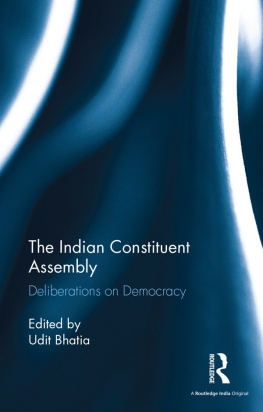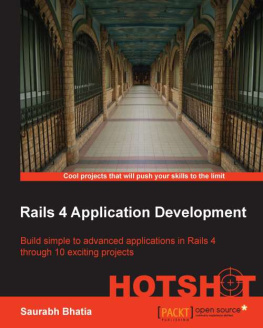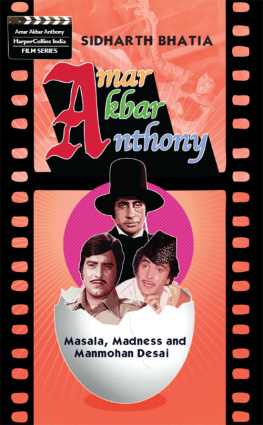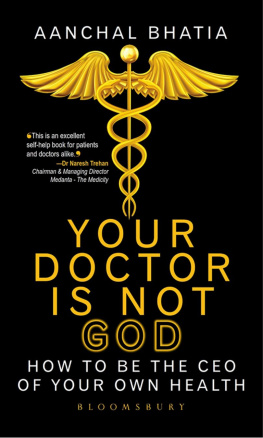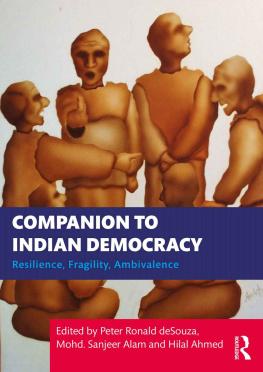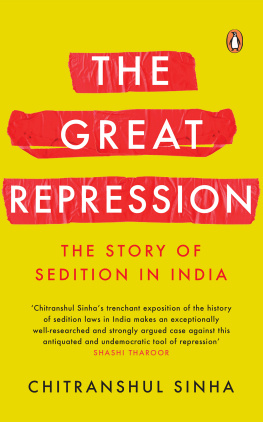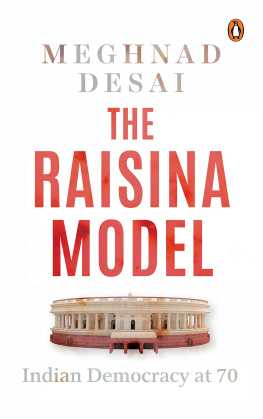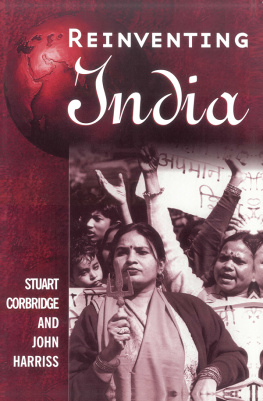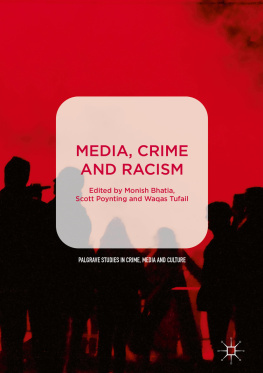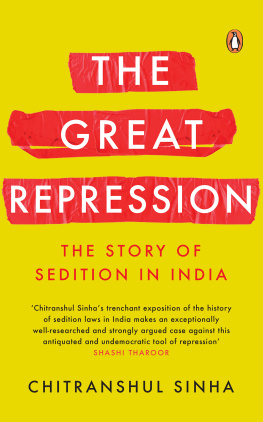Bhatia - The Indian Constituent Assembly : deliberations on democracy
Here you can read online Bhatia - The Indian Constituent Assembly : deliberations on democracy full text of the book (entire story) in english for free. Download pdf and epub, get meaning, cover and reviews about this ebook. City: Array, year: 2018, publisher: Routledge, genre: Politics. Description of the work, (preface) as well as reviews are available. Best literature library LitArk.com created for fans of good reading and offers a wide selection of genres:
Romance novel
Science fiction
Adventure
Detective
Science
History
Home and family
Prose
Art
Politics
Computer
Non-fiction
Religion
Business
Children
Humor
Choose a favorite category and find really read worthwhile books. Enjoy immersion in the world of imagination, feel the emotions of the characters or learn something new for yourself, make an fascinating discovery.
The Indian Constituent Assembly : deliberations on democracy: summary, description and annotation
We offer to read an annotation, description, summary or preface (depends on what the author of the book "The Indian Constituent Assembly : deliberations on democracy" wrote himself). If you haven't found the necessary information about the book — write in the comments, we will try to find it.
The Indian Constituent Assembly : deliberations on democracy — read online for free the complete book (whole text) full work
Below is the text of the book, divided by pages. System saving the place of the last page read, allows you to conveniently read the book "The Indian Constituent Assembly : deliberations on democracy" online for free, without having to search again every time where you left off. Put a bookmark, and you can go to the page where you finished reading at any time.
Font size:
Interval:
Bookmark:

The Indian Constituent Assembly laid the foundations of the largest democracy in the world. The debates between the members of the Assembly form the bedrock of the Indian Constitution. The chapters in this volume propose a range of methodological perspectives from which these critical debates might be read. Adopting a multidisciplinary approach, they explore themes such as party politics, ideas of rights, including caste and minority rights, social justice and the philosophy of free speech.
A major contribution to the study of Indian politics, this book will be indispensable to political scientists, political theorists, legal scholars, historians, lawyers and general readers interested in the history of the Indian Constitution.
Udit Bhatia is Lecturer in Political Theory at Lady Margaret Hall, University of Oxford, UK. He is a doctoral candidate at the Department of Politics and International Relations at Oxford, and his research interests lie at the intersections of democratic theory, political representation and social epistemology. He is currently examining the normative case against exclusion of persons from democratic citizenship on the basis of epistemic inferiority.
Edited by Udit Bhatia

First published 2018
by Routledge
2 Park Square, Milton Park, Abingdon, Oxon OX14 4RN
and by Routledge
711 Third Avenue, New York, NY 10017
Routledge is an imprint of the Taylor & Francis Group, an informa business
2018 selection and editorial matter, Udit Bhatia; individual chapters, the contributors
The right of Udit Bhatia to be identified as the author of the editorial material, and of the authors for their individual chapters, has been asserted in accordance with sections 77 and 78 of the Copyright, Designs and Patents Act 1988.
All rights reserved. No part of this book may be reprinted or reproduced or utilised in any form or by any electronic, mechanical, or other means, now known or hereafter invented, including photocopying and recording, or in any information storage or retrieval system, without permission in writing from the publishers.
Trademark notice: Product or corporate names may be trademarks or registered trademarks, and are used only for identification and explanation without intent to infringe.
British Library Cataloguing-in-Publication Data
A catalogue record for this book is available from the British Library
Library of Congress Cataloging-in-Publication Data
A catalog record for this book has been requested
ISBN: 978-1-138-22482-7 (hbk)
ISBN: 978-1-315-15790-0 (ebk)
Typeset in Galliard
by Apex CoVantage, LLC
UDIT BHATIA
ARVIND ELANGOVAN
SANDIPTO DASGUPTA
VATSAL NARESH
NEERA CHANDHOKE
GAUTAM BHATIA
ARUDRA BURRA
SHABNUM TEJANI
KALYANI RAMNATH
MANJEET RAMGOTRA
Gautam Bhatia is a practising lawyer and legal academic based in New Delhi, India. He specialises in Indian constitutional law. He graduated from the National Law School of India University, Bengaluru, India; read for the BCL and LLM degrees at the University of Oxford, UK, and Yale Law School, USA, respectively; and has taught as a visiting faculty member at the National Law School of India University and the West Bengal National University of Juridical Sciences. His articles have appeared in the Oxford Handbook for the Indian Constitution, The Australian Journal of Legal Philosophy, The Asian Journal of Comparative Law, Global Constitutionalism, and Constellations, and some are forthcoming. He is the author of Offend, Shock, or Disturb: Free Speech under the Indian Constitution (2015).
Arudra Burra is Assistant Professor of Philosophy at the Department of Humanities and Social Sciences, Indian Institute of Technology Delhi, India. He has a Doctorate in Philosophy from the Princeton University, USA, and a Juris Doctor from the Yale Law School, USA. His research interests explore different facets of the liberal tradition: the concepts of coercion, deception and consent, and their role in legal and moral argument; the continuity of law and legal institutions across changes of political regime and the nature of civil liberties, particularly freedom of speech.
Neera Chandhoke is former Professor of Political Science, University of Delhi, India. She is the author of Democracy and Revolutionary Politics (2015), Contested Secessions: Democracy, Rights, Self-Determination and Kashmir (2012) and The Conceits of Civil Society (2003) among others.
Sandipto Dasgupta is Assistant Professor of Political Science at Ashoka University, New Delhi, India. He is currently writing a book on the history and theory of the making of the Indian Constitution.
Arvind Elangovan teaches History at Wright State University in Dayton, Ohio, USA. He is interested in political and constitutional histories of nineteenth- and twentieth-century India and is currently working on his book on Sir B. N. Rau and the making of the Indian Constitution.
Vatsal Naresh is a graduate student in Political Science at Yale University, USA. He also has degrees in History and Political Science from St. Stephens College, University of Delhi, India, and Columbia University, USA. His research focuses on the areas of democratic institutions, political realism and constitution making. Before joining Yale University, he was graduate researcher at the Center for Democracy, Toleration, and Religion, New York, USA.
Manjeet Ramgotra is Senior Teaching Fellow in Political Theory at the School of Oriental and African Studies (SOAS), University of London, UK. Her work examines republicanism in the history of ideas. She has published articles on The Conservative Roots of Republicanism, Republic and Empire in Montesquieus Spirit of the Laws, on Rousseau and on diversifying the political theory curriculum. Presently, she is working on a project that considers why predominant Western understandings of republicanism elide postcolonial articulations and experiences of republicanism as well as a book on hierarchy and empire in the republican theories of Cicero, Machiavelli and Montesquieu.
Kalyani Ramnath is a doctoral researcher in History at Princeton University, USA. She graduated from the National Law School of India University, India, and Yale Law School, USA, with degrees in law. Between 2010 and 2012, she was a faculty member at the National Law School of India University teaching legal and constitutional history. While this continues to be her primary research interest, she is also involved in projects on comparative constitutional law and writes about histories of criminal procedure in India and Sri Lanka.
Shabnum Tejani is Senior Lecturer in the History of Modern South Asia at the School of Oriental and African Studies, University of London, UK. She is the author of Indian Secularism: A Social and Intellectual History, 18901950 (2012). Her work has been published in South Asia Research, Journal of Colonialism and History, and Economic and Political Weekly.
I am grateful to Jon Elster, Rohit De, and David Owen for emphasising the wide range of methodological perspectives from which Constitutionmaking can be approached. At Oxford, Liz Frazer, Tarun Khaitan, Jinal Dadiya, Sanya Samtani and Bruno Leipold have been terrific sources of learning on constitutions and democracy. I am also grateful to Rochana Bajpai, Humeira Iqtidar, Leigh Jenco and other members of the Comparative Political Theory Group in London. Harshavardan Raghunandhan, Utsarjana Mutsuddi and Ayesha Sheth gave valuable research assistance for this volume. I am also indebted to Aakash Chakrabarty at Routledge, who has been extremely helpful as this project developed. Essays by Kalyani Ramnath and Shabnum Tejani were previously published by
Font size:
Interval:
Bookmark:
Similar books «The Indian Constituent Assembly : deliberations on democracy»
Look at similar books to The Indian Constituent Assembly : deliberations on democracy. We have selected literature similar in name and meaning in the hope of providing readers with more options to find new, interesting, not yet read works.
Discussion, reviews of the book The Indian Constituent Assembly : deliberations on democracy and just readers' own opinions. Leave your comments, write what you think about the work, its meaning or the main characters. Specify what exactly you liked and what you didn't like, and why you think so.

